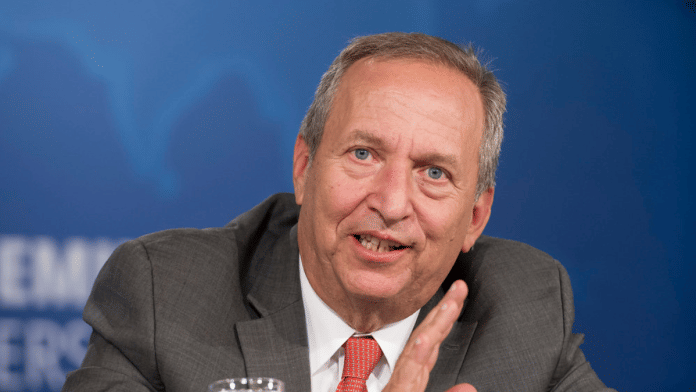New Delhi: Larry Summers has an impressive resume. He has served as US treasury secretary, chief economist at the World Bank, president of Harvard University, and as a key advisor to several US administrations. Among this impressive body of work also lies the fact that several emails were exchanged between him and convicted sex offender Jeffrey Epstein.
The emails are part of a cache of 23,000 documents released by the House Oversight Committee last week. They show that Summers shared a close friendship with Epstein.
According to The Wall Street Journal, Summers had sought advice from Epstein on raising $1 million to fund a project that his wife was looking to develop.
While Epstein died in prison in 2019, his much-maligned legacy has not. Summers now finds himself in the dragnet of the many influential and powerful people that Epstein charmed and cultivated. The Epstein files are yet to be released, but Summers’ long association and continued communication with Epstein even after his first conviction is out in the public domain.
Who is Larry Summers?
Summers is currently a university professor at Harvard, the highest faculty distinction. He also serves as the director of the Mossavar-Rahmani Center for Business and Government at the Harvard Kennedy School.
His stature and continued influence in the corridors of power make him a marked man. Apart from his association with Harvard, he occupies several senior positions, including a board seat at OpenAI, senior fellowship at Center for American Progress (CAP), and contributing writer for The New York Times. He also writes features at Bloomberg News.
Economics runs in the family for Summers — two of his uncles, Paul Samuelson and Kenneth Arrow, are Nobel laureates. After obtaining a bachelor’s degree from Massachusetts Institute of Technology (MIT), Summers started his journey as an academic in 1983, becoming a professor of economics at Harvard University. He was one of the youngest individuals to be named as a tenured member of the Harvard faculty.
In 1991, he left Harvard to work as Chief Economist at the World Bank. Then, two years later, Summers was appointed as US Treasury Under Secretary for International Affairs under Bill Clinton’s presidency. He was named the Treasury Secretary in 1999. Under the Clinton administration, Summers played a pivotal role in the 1994 Mexican Peso crisis — when the Mexican currency was being devalued under a new government.
He was part of the advisory that urged Clinton to authorise a $12-billion loan in “support” for Mexico without legislative approval — citing exchange-rate stability. This was a liquidity injection far more than the IMF could provide, and it prevented a possible bank-run-induced economic meltdown. The end result was a revitalised economy and peaceful transition of power in Mexico. And the United States made $450 million in profits from the loan.
Summers, along with Robert Rubin (his preceding Treasury Secretary) and Alan Greenspan (former Federal Reserve Chairman), were lionised in a famous Time magazine cover headlined The Committee to Save the World.
But his detractors would say otherwise. Under the North American Free Trade Agreement (NAFTA), the US got Mexico to liberalise capital accounts, which made it vulnerable to the movement of foreign capital. The sudden inflow of foreign funds caused overvaluation of the peso and when the funds exited, the currency collapsed. The US and the IMF responded with bailouts and demanded further liberalisation. While Wall Street recovered its investments, real wages in Mexico fell.
Similarly, during the 1997 Asian financial crisis, another currency devaluation situation arose. Again, Summers, the US, and the IMF were blamed for creating the pressure on these countries to open their capital markets. Summers led key policies, which tended to use American influence on developing countries and the former Soviet Union to open their markets as quickly as possible.
He was also influential in deregulating the US’ own financial system, including the repeal of the Great Depression era Glass-Steagall Act that separated commercial banking from investment banking.
Criticising the move, US Senator Elizabeth Warren told Bloomberg that “it will take a lot of tools to get rid of too-big-to-fail, but one of them ought to be that if you want to do high-stakes gambling, good on you, but you do not get access to people’s checking accounts and savings accounts”.
Economic darling
After the Clinton era, Summers served as president of Harvard University from 2001 to 2006. He resigned on account of a no-confidence vote by Harvard faculty. Apart from faculty discord, conflict of interest, one reason for this loss of confidence was a 2005 speech in which he spoke on the under-representation of women in science and engineering. He argued that boys outperform girls on high school science and maths scores because of genetic difference. During his Harvard presidency, the number of tenured jobs offered to women fell from 36 per cent to 13 per cent, reported The Guardian.
Post this academic sojourn, he found himself back in public service under President Barack Obama, serving as the Director of the National Economic Council from 2009 until 2010. He emerged as a key economic decision-maker during another financial meltdown — the Great Recession. Keeping with tradition, he defended the stimulus package rolled out — he hoped to become the Chair of the Federal Reserve.
The economic darling of two Democratic presidencies, Summers faced opposition on being included in the Biden administration. Since then, he has changed views on bailouts and stimulus packages, criticising Biden’s Covid pandemic relief proposal as too big.
“When you make someone like Summers an outcast, that doesn’t make them mute,” read a report in Times. It will be interesting to see how Summers comes back from the social outcasting he faces in light of the Epstein revelation.
Johan Jose is a TPSJ alumnus currently interning with ThePrint.
(Edited by Aamaan Alam Khan)







Any institution “investigating” itself (Harvard, in this case) is no investigation at all.